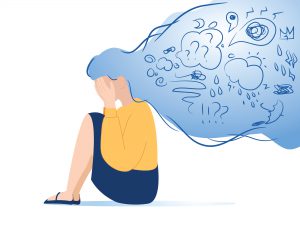 Acute stress disorder (ASD) is a trauma and stress-related disorder that typically develops within three days to one month after a traumatic event. Examples of such events are physical or sexual assault, the sudden death of a loved one, a car accident, a natural disaster or receiving a life-threatening medical diagnosis. According to the American Psychiatric Association, “An estimated 13 to 21 percent of survivors of car accidents develop acute stress disorder and between 20 and 50 percent of survivors of assault, rape or mass shootings develop it.”
Acute stress disorder (ASD) is a trauma and stress-related disorder that typically develops within three days to one month after a traumatic event. Examples of such events are physical or sexual assault, the sudden death of a loved one, a car accident, a natural disaster or receiving a life-threatening medical diagnosis. According to the American Psychiatric Association, “An estimated 13 to 21 percent of survivors of car accidents develop acute stress disorder and between 20 and 50 percent of survivors of assault, rape or mass shootings develop it.”
Symptoms of ASD generally last up to one month after the traumatic event, and may include:
- Anxiety
- Intrusive thoughts and memories
- Nightmares
- Avoidance of people, places or things that trigger memories
- Dissociation
- Changes in mood
- Reckless or destructive behavior
- Heart palpitations, difficulty breathing, abdominal pains or any other physical symptoms that can be caused by elevated stress
If symptoms persist beyond one month, they are often indicative of the development of post-traumatic stress disorder (PTSD).
Anyone can develop ASD after experiencing a traumatic event. People with ASD are at an increased risk for developing PTSD, this is why it’s important to receive treatment as soon as possible to prevent this progression.
ASD can be diagnosed after a person has experienced symptoms for at least three days. A mental health provider will perform a series of examinations or evaluations to rule out causes such as health problems, substance abuse, medication side effects or other psychiatric disorders.
Treatment for ASD can involve cognitive behavioral therapy, medication or exposure-based therapies.
To schedule an appointment with a mental health professional at Jamaica Hospital Medical Center, please call 718-206-5575.
All content of this newsletter is intended for general information purposes only and is not intended or implied to be a substitute for professional medical advice, diagnosis or treatment. Please consult a medical professional before adopting any of the suggestions on this page. You must never disregard professional medical advice or delay seeking medical treatment based upon any content of this newsletter. PROMPTLY CONSULT YOUR PHYSICIAN OR CALL 911 IF YOU BELIEVE YOU HAVE A MEDICAL EMERGENCY.
